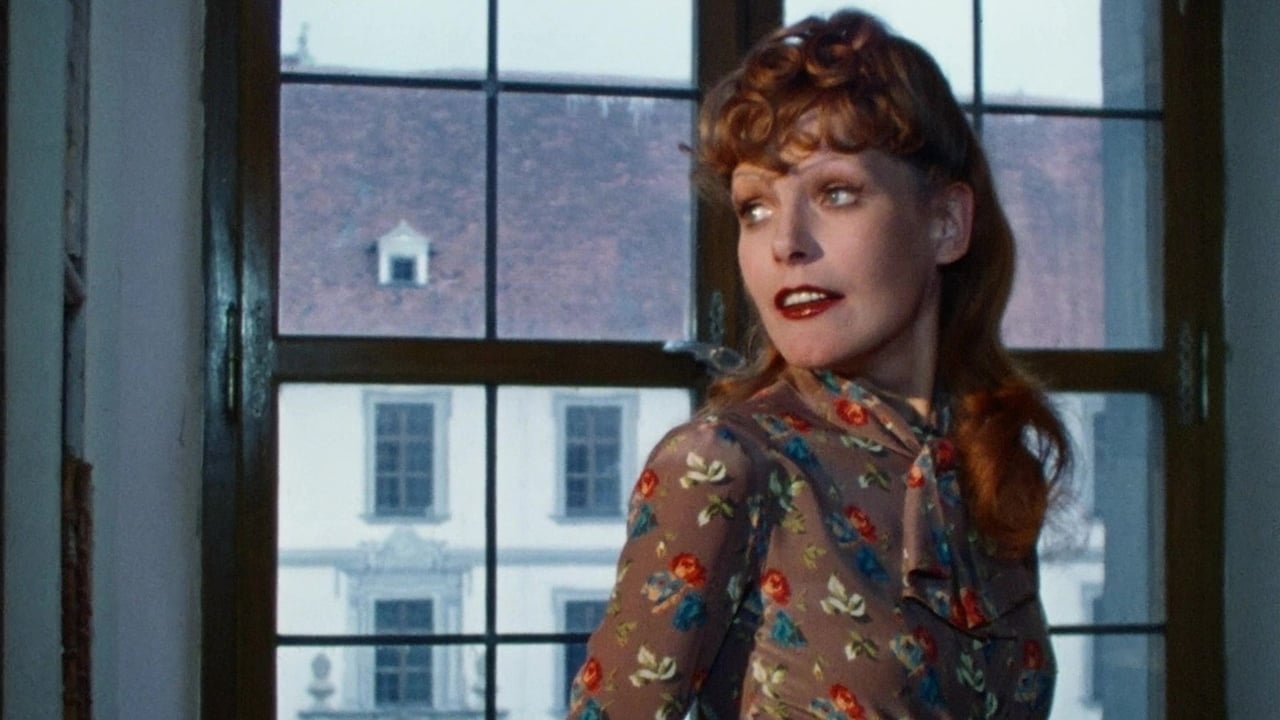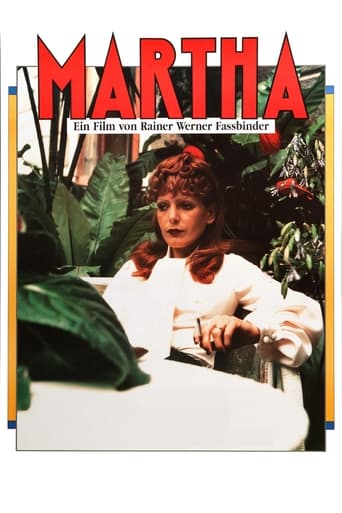



Am I Missing Something?
Absolutely the worst movie.
While it doesn't offer any answers, it both thrills and makes you think.
View MoreExcellent and certainly provocative... If nothing else, the film is a real conversation starter.
View MoreAnd that does not only include the title character, but also the co-lead played in a truly sinister manner by Katlheinz Böhm. 1974 was a great year for Rainer Werner Fassbinder. He made this 110-minute film here, but he also directed the equally brilliant "Angst essen Seele auf" and it's almost impossible for me to pick my favorite Fassbinder out of these two. I am generally not the biggest fan of the director, but these two are excellent pieces of filmmaking. In "Martha" we see one of the best combinations of writing and acting in the history of movies when it comes to sadist characters. And an equally brilliant portrayal of masochism. And still Carstensen's character occasionally tires to break free. This inner contradiction is probably also what got her the German Film Award nomination (she lost to Brigitte Mira from the movie I mentioned previously). No awards recognition for Karlheinz Böhm though although he was so so good If you have seen him in the Sissi movies, you can basically imagine the exact opposite and you will have his Helmut Salomon, a true psychopath.There are so many memorable scenes in this film, the one about wishing the title character dead, another one about Salomon's favorite food or also the beginning with Martha's father dying. In that situation, she was weak anyway and it would not have been a challenge for Salomon to break her entirely. That's why he just didn't go for it back then. Basically, there are so many great scenes in here that I cannot list them all: the way he insults her constantly, for example during their meeting at the party, the way he talks about her music, about her hair, the way how he forces her to read the book about his job after what he did to her with her job, the cat scene. He will not even share her with a pet And finally, another scene that stands out very much is the sunburn scene (keep in mind how he did not wake her up when she fell asleep, maybe even gave her pills) and how he has sex with her despite her being in huge pain. That was really really painful to watch. He is absolutely turned on by her when she is at her weakest, her most fragile and there are more examples of that how he really wants her the most when she is suffering. A textbook sadist.And then the ending: She flees from him and he is as collected and in control as always. Finally, she has a car accident that not only takes away the only person who sort-of helped her and with whom she could talk about her marriage, but it also takes away her ability to walk and that is how she becomes pretty much completely dependent on her husband. She cannot leave the house anymore as there is no way he will make it barrier-free for her and this is what he wanted from the start. In general, after such an accident it is often a reason people split and it can be considered as a true confession of love if a person does confess his love to his wife despite her new disability. But that's what he does and here it is not positive. It is love yes, but in the most sadistic manner one could imagine and I guess I really don't wanna see all the horrible things that will happen after this film from over 40 years ago ends. This is a very cruel movie. And at the same time, it is a triumphant character study about two people who are (not) made for each other. Highly recommended.
View MoreMartha Heyer, a librarian in her thirties (Margit Carstensen), is completely oppressed by her high-strung parents but receives a lot of attention from different men, all of whom she turns down because of her family. After the sudden death of her father (Adrian Hoven) and the suicide attempt of her unstable pill-popping mother (Gisela Fackeldey), she is approached by a handsome engineer named Helmut Salomon (Karlheinz Böhm) and agrees to his marriage proposal. He turns out to be a complete sadist and torments her in various ways, from isolating her from her former life to having her skin burnt in the sun and then roughly having sex with her. Martha doesn't know how to cope with the situation and just takes it all in without knowing how to put her anxiety into words, even though a friendly colleague Mr. Kaiser (Peter Chatel) would be willing to listen. Eventually things escalate dramatically.The film's outlook of marriage is definitely bleak; besides Martha's private hell, the marriages of her friends are also presented as shallow and dishonest. The question of why Martha is so helpless and unable to defend herself against Helmut goes back to her old life with her overbearing parents: even though she shows signs of sarcasm and emotional detachment from them, she ultimately cannot leave their influence behind – the devastating power of upbringing and lifelong submission is one of the main themes of the film.The technical direction of the story is done brilliantly; the long shots with moving cameras and the use of mirrors in the mise-en-scène are all enjoyable to examine throughout. Especially the spinning shot of Martha and Helmut's first encounter in Italy dizzies the mind in a good way and catches the feel of instant attraction well. Nevertheless, however skilfully presented, at almost two hours the parade of emotional cruelty feels a little too long and gets slightly repetitive towards the end. Over all, the development from the Ingmar Bergman-style family hell to the melodramatic last scenes helps to create a memorable and effective story arc for the tale though, and the actors suit their roles fine, especially the mousy, red-haired Carstensen. At the time of writing this review, I have yet to see many Fassbinder films, but Martha has certainly gotten me enthusiastic about seeing more as soon as possible. I eagerly recommend the film to anyone interested in R.W.F.'s work or the nature of oppressive relationships.
View MoreI was so amazed by this genius, the way that Fassbinder holds his camera as if it was his own child. I've rarely seen somebody mastering the art of camera as much as Fassbinder does. He's all over it, he sees beyond the human eye. The shot where Martha meets Helmuth for the first time in Roma is amazing... my heart stopped for about 3 seconds... I couldn't believe what I just saw...I saw this shot many times but I was afraid that I might loose interest in it if I kept playing it again and again. But I didn't. As for the story, it is very beautiful indeed, strange and disturbing. It's one of the best filmed movie ever done in my opinion. Don't miss it.
View MoreGood, nearly great Fassbinder about an adult woman who passes from the care of her controlling parents to the even tighter control of a bizarre husband. Margit Carstensen plays the woman and Karlheinz Böhm (whom you probably remember as the protagonist of Michael Powell's Peeping Tom) the husband. This is one of Fassbinder's better films. Jonathan Rosenbaum, who doesn't seem to be much of a Fassbinder enthusiast, cites it as his very favorite. It would rank as one of my favorites, too, but for a couple of reasons. It kind of makes its point fairly early on, especially after the marriage takes place. Then it gets a tad repetitive, and goes on for nearly two hours. The next year, Fassbinder made an even better film dealing with similar themes called Fear of Fear, which also starred Margit Carstensen. Carstensen's performance is exceptional in Martha (and just as good in Fear of Fear), and Böhm is quite good, too.
View More